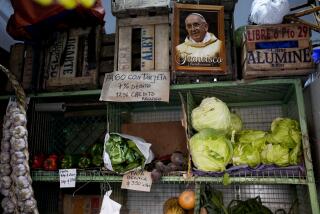But Candied Apple Carries a Worm Called Inflation : Yule a Consumer’s Delight as Brazil Economy Revives
- Share via
RIO DE JANEIRO — Like a seaman reefing sails on a schooner, Lygia Pedreira hauled down one of the fringed hammocks floating over her wooden stall.
A quick sale followed, and the transaction in the hubbub of the Sao Cristovao market could be seen as a symbol of the consumer boom sweeping through Brazil this holiday season.
“This has been the best Christmas I have seen since I began selling here four years ago,” Pedreira said after a customer took the hammock and paid her with a fistful of cruzeiro notes worth about $20.
‘Worth Less Every Day’
“But this money is worth less every day, so it’s always the same race to keep up,” she said as she stuffed the bills into her purse.
In all the big shopping centers here and in Sao Paulo, business is excellent. Sales are up from 10% to 25% over last year, according to reports. The pattern is the same for sales of automobiles, clothing and toys.
Every Brazilian seems to have more money to spend. Bus terminals are jammed with gift-laden travelers.
Last weekend, on a bus to Cabo Frio, 100 miles northeast of here, Evaldo Simoes and his wife were taking their 2-year-old daughter to visit her grandparents for the first time. “We couldn’t do it last year. I didn’t have a job,” said the 25-year-old Simoes, who works in a print shop here.
Largest Foreign Debt
This country of 135 million people has the largest, most industrialized economy in Latin America. It also has the largest foreign debt, slightly over $100 billion.
In 1981, recession set in as debt payments exceeded new loans. Factories shut down and layoffs began.
But last March, Brazil installed a new, democratically elected civilian government, and its economy became one of the fastest-growing in the world.
There are more jobs, with 1.5 million more workers employed. There is more money, with unions winning wage increases after several major strikes.
But, most basically, there has been a sharp increase in the production of goods and services, up 7% over 1984. The higher output has provided $26 billion in exports, nearly half of which has gone to pay interest on the foreign debt.
Worm in the Apple
The worm in this candied apple is inflation. Prices rose 225% last year, and inflation has not been tamed. It is expected that the cost of living will rise 14% in December alone and that the annual inflation rate will be the same as last year’s.
President Jose Sarney’s government is satisfied with the economic recovery--higher employment and the consumer boom have yielded political dividends to the government--but is worried about inflation.
This year, food crops were good and covered local demand, with a surplus for exports. However, the prospect for next year, after a serious drought in the major southern food-producing states, is for shortages. Up to $1 billion in imports of rice, beans and beef will be needed to control prices.
Congress has approved a budget for 1986 and new tax legislation that is supposed to eliminate most of a $16-billion deficit in federal spending that contributed to inflation this year.
Elections Next Year
But Sarney and Finance Minister Dilson Funaro are determined to keep the economic boom going through the end of next year, when elections are scheduled for state governors and for a new Congress that will have the responsibility of reforming the constitution.
The political climate does not seem conducive to budget-cutting and austerity.
Funaro has called on businessmen and union leaders to agree to a temporary freeze in wages and prices while the government puts spending cuts into effect. However, both business and labor have called on the government to cut spending before asking the private sector to make sacrifices.
Sarney has rejected “recessionary” austerity measures that would be required by the International Monetary Fund as a condition for refinancing the foreign debt. He favors an expansionary economic policy, even if present rates of inflation continue.
Threat From Inflation
But growing inflation, which is widely feared because of the prospect of higher demand and loose fiscal management, threatens good labor-management relations and the government’s political relations with both sectors.
Businessmen are opposed to paying higher taxes, even after a 12% rise in industrial output this year, saying they need to make new investments to keep up with increased consumer demand and exports.
More to Read
Sign up for Essential California
The most important California stories and recommendations in your inbox every morning.
You may occasionally receive promotional content from the Los Angeles Times.













